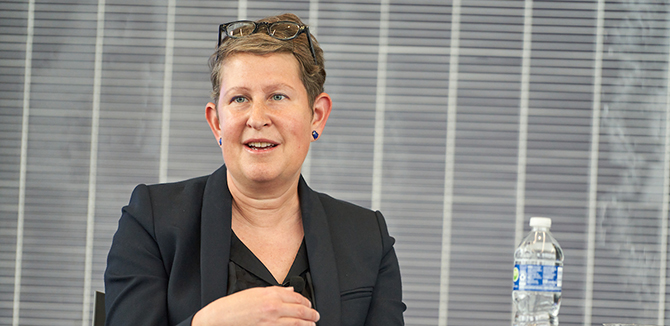The Question of Industry Versus Lab Work
Biotech Nexus panelists highlighted the diverging paths MBP students often face.

Most students in Northwestern Engineering's Master of Biotechnology Program (MBP) reach a point in their studies where they face diverging paths and must make a choice. Do they want to pursue a career in an academic lab, or do they want to focus on landing a job within industry?
Which decision is the right one?
Panelists at the 2023 Biotech Nexus event hosted by MBP made it clear that from their perspective, there is no single right answer. Each could lead to fulfillment and growth.
The panel was composed of speakers traveling each road, giving those in attendance a diverse view of success stories from both academia and industry. The panelists said they have respect for those on either road because they all contribute to advancements that make a difference.
“You can't understate the value of that opportunity to really dive into deep research, deep learning, and being versed in an educational environment,” said Susan Schofer, a hard tech venture capital investor, partner at SOSV, and partner and chief science officer at HAX. “When you think about how science is done within industry, there's a different customer. Rather than just looking for scientific information, you need to reframe and think, ‘What's the use case?’”
Schofer has traveled both roads during her career. She was joined on stage by:
- Asha Varghese (MBP '18), clinical research manager for UT Southwestern Medical Center
- Matt Barnes (MBP '10), client partner and senior director at IQVIA
- Paul Marks (MBP '17), product specialist of tangible flow filtration and filtration systems for Sartorius
- Phillip Freeman (MBP '21), process development manager for Clever Carnivore
Varghese’s career has taken her down the research road. She has found fulfillment by diving deeply into projects that lead directly to new treatments that help ease patients’ suffering.
“Every clinical trial is different. You're dealing with the same terminology, but the way that you are doing and dealing with these studies is completely different,” she said. “You are continuously learning.”
Freeman has taken the industry road. Clever Carnivore currently is developing meat from the tissues of animals such as chickens, cows, and pigs to recreate an authentic taste, feel, and look while minimizing the impact of meat production on the environment. Success could also help address forecasted food shortages across the globe.
He said being in industry suits his desires much more closely because it allows him to take well-researched science and zoom out to see issues where science can be applied.
“You step outside of it and you have to think about how this fits into the bigger picture,” he said. “How does our product fit into the global meat market and can we make an impact? How much better is our product than somebody else's, too?”
Even those who find themselves on one road find tremendous value in those who are traveling the other. Barnes’s work sees him in industry, but he couldn’t do what he does without academic researchers.
The fact that two roads exist and have a variety of points at which they intersect make a career in biotechnology and an MBP degree valuable pursuits, the panelists said.
One vital skill is necessary no matter which road students find themselves traveling, the panelists said. Schofer made sure to highlight it for the gathered crowd.
“One of the biggest learnings for me transitioning from being a scientist in the lab was the importance of relationships,” she said. “Communication is one of the top things I have learned and that I relearn almost every day.”

